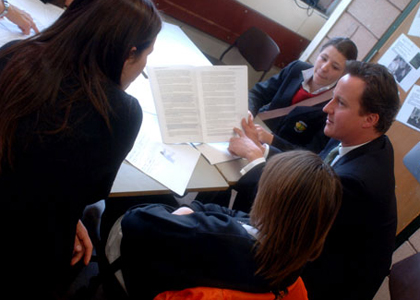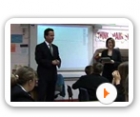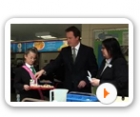
|

|
English classes, playground duty, and helping supervise lunch
15/05/2007
After two days living with a Muslim family in Birmingham – two days as
a teaching assistant in a Hull secondary school. Two English classes,
some playground duty, and helping supervise lunch are the main elements
of my day. Remembering how to analyse and write about poems, without
getting my metaphors confused with personification, oxymorons or
enjoinment is one of the main challenges.
Two English classes, some playground duty, and helping supervise lunch
are the main elements of my day. Remembering how to analyse and write
about poems, without getting my metaphors confused with
personification, oxymorons or enjoinment is one of the main challenges.
Tomorrow I'll be helping the history department, which I hope will be
more familiar territory.
I'm at a recovering school serving a pretty tough housing estate on the
outskirts of the city. A few years ago this school had one of the
lowest GCSE pass rates in the country – now it's above the national
average with 62 per cent getting 5 A-Cs at GCSE. But when you look at
the percentage getting these grades in core subjects like English and
maths, the percentage falls to 7%.
The day starts badly, for me at least. Helping register a class of 13
year olds, no-one – and I mean literally no one – has even heard of the
Conservative Party. Using “hangman” on the smart new interactive
whiteboard we get to “Conser_ati_e party” before any one gets it. As
the point of me being here is to observe and to learn – and not get the
usual “here's a visiting politician” treatment - maybe this is a good
thing.
I'm not the only one with a bad start to the day. I meet a 16 year old
boy loitering outside the hall where he's supposed to be sitting an
important GCSE and he tells me he feels rotten - “got pissed last
night” - and isn't looking forward to the exam. A timely reminder that
improving schools is as much a matter for parents as it is for teachers.
Impressions?
The skill that some teachers have in maintaining order, using their
natural authority, while making the subject interesting is a wonder to
behold. Given that they are doing this at a time – during GCSEs - of
maximum “teaching for the test” it's even more impressive.
But the overwhelming impression I get is of the importance of good
behaviour and discipline. It's what the teachers talk about most – and
it was the thing that most exercised a small group of kids I had lunch
with. And in every class you can see the potential, and often the
reality, of poor behaviour by a few wrecking the chances of the rest.
And this is in a school that has made huge strides; as the deputy head
said to me, before recent changes they were “just glorified baby
sitters” looking after children who often behaved appallingly. Truancy
– or “twagging” in the Hull slang - is still a problem but here it's
getting a little better.
Two teachers I have coffee with in a small staff room would favour a
zero tolerance of poor language and behaviour – and I think they're
right. In the run up to GCSEs you feel so clearly that these kids only
get one chance – and for too many it's simply missed.
Of course there's more to say about teaching methods, the madness of
closing special schools (including those for children with behavioural
problems), the paramount importance of the basics and the dangers of
new teaching fads (I am still to be convinced by the mania for
“personalised learning”), and I will say more about these things
tomorrow. But order, discipline and behaviour absolutely have to come
first.
The current system makes it harder to enforce discipline. Like all
schools, the one I'm at is fined for every pupil they exclude, so it's
not surprising that they try and avoid excluding disruptive pupils even
when they want to do just that. The result is that language and
behaviour that simply would not have been tolerated in the past is put
up with. What's more, the kids know it.
Change in our society – big, long term, substantial cultural change -
is needed. And we should start by making every school head the absolute
captain of their ship, able to maintain discipline and exclude poorly
behaving pupils without being second-guessed or penalised for doing it.
Of course we need to think hard about how to turn excluded kids around
– the current system based around Pupil Referral Units is a bit of a
disaster. In the last few months I've visited a couple of fantastic
social enterprises that do a brilliant job with excluded kids, and
we're working on plans to enable them and similar organisations to be
able to offer their expertise to more and more kids who need it.
But I've seen today how much teachers and pupils suffer from and resent
the bad behaviour of a minority ruining the chances of the majority and
we've been far too soft on this. Teachers want to teach and most kids
want to learn – it's pathetic that our education system makes it
harder, not easier for them to do that.

|
|
A great experience, only slightly marred by the grammar schools row
17/05/2007
Finish teaching in Hull and travel to Blackpool for the Police
Federation conference. I cannot praise the school more highly. They
were incredibly helpful, friendly and accommodating. When, inevitably
the LEA kicked up a fuss “why weren’t we told?” (Answer – because you
would have found a thousand bureaucratic reasons to say “no”, or told
the press or both) the head teacher was calm and reasonable. Given the
results and the atmosphere in the school (and her ability to put up
with me) she is clearly doing a great job.
The teaching is a great experience (more later), only slightly marred by the row about grammar schools.
I announced over a year ago that the party would not go back to a
policy of opening new grammar schools or introducing the 11 plus and so
am slightly surprised that the press has got so excited about this
clear pledge being given all over again by David Willets.
The Telegraph coverage and comment is near hysterical. They simply
don’t understand that the idea of introducing a few extra grammars says
nothing to thousands of parents worried about children languishing in
failing schools. In many ways, “bring back grammars” is a meaningless
slogan, as the reason the 11 plus went in so many parts of the country
is because it was so unpopular with parents. It is a classic example of
fighting a battle of the past rather than meeting the challenges of the
future. And it is politically naïve as it just says “we’ll help a few
more escape failing schools rather than turn them round for all
children.” The way to win the fight for aspiration is to put those
things that worked in grammars – aggressive setting to stretch bright
pupils, whole class teaching, strong discipline to name but three – in
all schools.
What is sad is that the commentators miss all the things we’d do that
would help standards and aspiration for all – synthetic phonics at
primary school, zero tolerance of bad behaviour, unchallengeable rights
for heads to exclude difficult pupils, enforceable home school
contracts, saving special schools, setting and streaming, and expanding
academies, allowing churches, voluntary bodies and others to open new
schools.
Perhaps if I put the words “Bring back” in front of some of these policies they might just get it.
Anyway, back to teaching.
I found being a teaching assistant much easier in history than English.
I helped a really bright set with a slavery project. Every single child
in the class wanted to learn and succeed (see, setting works). However,
as a result, my assistance – bit of spelling advice, an idea here or
there – was probably of limited value. Helping the bottom set with
“post 1945 reconstruction” on the other hand I was rushed off my feet.
Personalised attention, assisting with plans for their presentations,
advice about sources and information – I felt that I was really
helping. That said it took me longer than it should to see that one boy
was playing pacman rather than reading about the Yalta conference.
|
|
|
 |
 |

Two days as a teaching assistant - first of 4 videos
|

Two days as a teaching assistant (2/4)
|

Two days as a teaching assistant - (3/4)
|

Two days as a teaching assistant (4/4)
|
|


|
|
